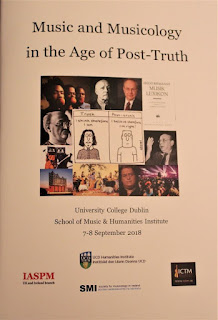When I saw that the conference title was "Music and Musicology in the Age of Post-Truth" and read the call for papers, I knew it was a great fit for my views as a scholar and the mission of my blog. Mythbusting is a quest for verifiable truth, and I do my best to explain how certain myths endure and why people choose to believe them.
 |
| Programme booklet for the Music and Musicology in the Age of Post-Truth conference. |
Since this conference intended to reflect on present culture, I realized I had to step away from my nineteenth-century comfort zone and find something recent to investigate. I pitched a paper that would be an offshoot of the lecture I delivered at Utah State University last January, which dealt with the perception of classical music as cultivating better morals in its listeners. Since the presentation could only be twenty minutes long (with ten additional minutes for questions and discussion), I had to narrow my focus. So, I chose one of the hottest topics in classical music at the moment: the scandals surrounding former Metropolitan Opera conductor James Levine.
Between the time my abstract was accepted in April and the conference in September, the Levine story just kept developing, with lawsuits, counter-suits, and think pieces on each new revelation. I had to focus even more just to keep from drowning in the information that just kept pouring in throughout the summer.
As a reception scholar, I was most interested in public reaction to the developments. As a bit of a rabble-rouser, I felt irked by the reactions of some of the more conservative classical music fans (and by "conservative" I mean those who wish to maintain the status quo, regardless of political stance), the ones who defended Levine explicitly because he has an extraordinary musical talent. That defense ties into something I battle frequently on this blog: The idea that classical music is a superior art form.
So I've spent the past few weeks working on my paper, "When #TimesUp for Musical Gods: The James Levine Scandal." It's significantly shorter than my original draft, which had a lot of historical context, much of which has been hashed out on this blog already. But here is the text of my talk, publicly accessible on Humanities Commons (as was my earlier USU talk). There are links to the PDF near the bottom of the page; if you encounter difficulty accessing it, just email me and I'll send you a copy.
 |
| My presentation at "Music and Musicology in the Age of Post-Truth" at University College Dublin on September 8, 2016 |
As for the conference itself, it was an incredible experience! Much of that had to do with the careful selection of papers and the thoughtful organization of the schedule. Even though the scholars came from all over the world (US, UK, Ireland, Canada, Australia, South Africa, Germany, Poland, and Japan) and we specialized in different topics with different approaches, our papers really spoke to each other, making for meaningful discussions. And that's where the scheduling really helped—each panel, or set of 2-3 papers, was followed by either a coffee and tea break or a catered meal. That gave us time to take in what we'd just heard and ask questions in a less formal setting. Also, there were no co-current sessions; with only one paper presented at a time, everyone had the opportunity to hear all the papers. We could start from the same frame of reference when offering our contributions. This conference felt more cohesive than any other I've attended.
All in all, I had a wonderful time in Dublin. I stayed at a lovely bed and breakfast recommended by the conference organizers, with exceptional service and delicious food. I got a few days away from parenting, and I got interrupted sleep for the first time in a while! I regret that I had neither the time nor energy for sightseeing, but I hope that circumstances will permit me to return to Ireland someday.
Like what you’ve read?
No comments:
Post a Comment